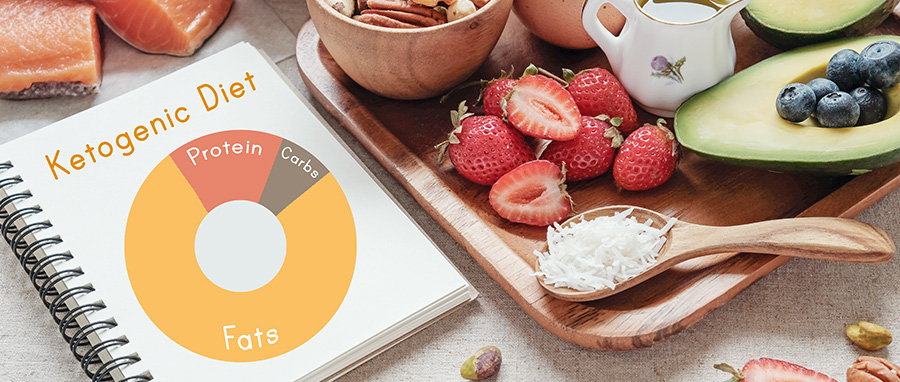By David Cajthaml Tree House Staff
Early on in my recovery from addiction I really put on some body fat. The drugs that were impacting my metabolism and curbing my hunger were no longer there. I was exercising very often and so I thought I could eat as much as I wanted to. I didn’t even realize how much fat I had accumulated until a true friend expressed his concern for me. When I wasn’t getting it, he had to come out and say it: “You’re fat!”. I was borderline obese and didn’t realize it, that harsh reality may have saved my life.
I took action and started where many people do: by counting calories. I was around 27% body fat and over the course of a few months I lost about 5 pounds. I was losing weight but very slowly — I didn’t understand it. I was exercising vigorously for more than an hour a day 5-7 days a week, and I was at a caloric deficit. I barely lost any weight. I was frustrated and ready to try something new and bold.
Keto Diet Explained:
The simple explanation is that keto diet involves eating around 70% fat, 25% protein, and around 5% carbohydrates. The diet was shockingly effective. I lost 40 pounds in about two months. What is even more shocking is that this result is not uncommon. If you browse internet spaces, such as Reddit, you find the same thing over and over — massive body fat loss. What is even more shocking is that some people lose weight while eating at a caloric surplus. That is, even though they eat more than they need they are still losing weight. How is this possible? That doesn’t make sense according to the most common model of weight gain/loss: CICO, or “Calories In, Calories Out”.
Before starting the diet, I did a lot of research. However, a lot of the research is still emerging and relatively new. I found the following pieces in this puzzle:
Insulin is the storage hormone.
If your body releases insulin it is placed into storage mode. Insulin is released when your body has to remove glucose (“sugar”) from your blood, for example when you eat carbohydrates. So, if you’re constantly eating carbohydrates, your body is constantly releasing insulin. Studies have shown that you can gain weight while on a caloric deficit if insulin is injected into the body. This means that if I were to follow you around all day and every time you ate something I inject you with insulin, no matter if all you ate was broccoli, you would gain fat.
If your body doesn’t have insulin it can’t gain weight (Type 1 Diabetes)
If you are a type 1 diabetic you have to take insulin regularly because your body doesn’t produce it. Prior to the invention of synthetic insulin if you had type 1 diabetes you would basically starve to death no matter how much food you ate. Type 1 diabetes was always fatal, adults and children alike would die very quickly prior to the invention of synthetic insulin.
Insulin resistance (Type 2 Diabetes)
Your body can become tolerant to anything. If you do 100 squats every day, eventually it will be easy, your body adapts to it. If you become addicted to drugs, your body needs more and more of the drug to produce the same effect because your body adapts and becomes used to the drug. The same exact thing happens with insulin. Your body can become resistant to its own hormone. If you eat carbohydrates, your blood glucose (sugar) rises. Your body detects this, releases insulin to remove the blood sugar, and your body is placed into storage mode as a byproduct. If you were to eat enough carbs over time your body would need to release more and more insulin and your body would be placed into storage mode longer and longer. It is absolutely no coincidence that an overwhelming majority of people who are obese have type 2 diabetes.
Brown Adipose Tissue or “Brown Fat” is a thermoregulator. White Adipose Tissue or “White Fat” is for storage.
Brown fat’s job is to turn energy into heat. This is why babies don’t shiver, they have a lot of brown fat. This also explains why it’s possible for your body to lose weight while at a caloric surplus: your body turns excess energy into heat. On the other hand, white fat can also turn energy into heat but that’s not its normal job. White fat’s normal job is to convert energy and expand, or store energy. White fat is what you see on people that are known in our society as “fat” or “overweight”.
The hormone insulin determines what brown fat cells and white fat cells do.
If insulin is present brown fat will actually act more like white fat and store energy. On the other hand, if insulin is not present, over time, white fat will act like brown fat and convert energy into heat. White fat cells will also shrink as a result of burning energy. You will always have the same amount of fat cells in your body. It’s the size of these fat cells that is the issue.
Brown fat is the reason your body can lose fat while eating at a caloric surplus, as long as insulin isn’t being released your body will just burn off some of the excess calories as heat through its brown adipose tissue.
Calories in, calories out, and the idea that your body is a perfect thermodynamic system.
CICO basically states that if your body needs 2000 calories a day, and you eat 2250, you will gain weight (caloric surplus). Conversely, if you eat 1750 calories a day you will lose weight (caloric deficit). This has been the long standing explanation for weight gain and loss. However, it does not factor in hormones, mainly insulin.
Eating at a caloric deficit for a long time lowers your BMR or “basal metabolic rate” (how much energy you burn by existing)
Say that your body needs 2000 calories a day to maintain weight. If you were to eat at a deficit of 500 calories, so around 1500 calories per day, you would start to lose weight but over time your body would re-adjust to the deficit and “make” your new BMR in line with the reduced consumption. The body is smart, if it realizes it’s starving it decreases the energy burned to protect itself.
Let’s look at the last few points a little more closely. If you eat 2000 calories a day but 500 of those calories are converted by insulin into fat (that your body doesn’t need or want) your body is actually starving. You have just put yourself into a caloric deficit. If this were to continue you would gain fat, and your BMR would continue to decrease, as a natural defense mechanism to your body “starving”.
Time to connect the dots! Insulin is like your body’s on/off switch for its “storage mode”. Without insulin you literally cannot gain weight (Type 1 Diabetes). When insulin is present in your body, your white fat cells get larger and your brown fat cells burn very little energy as heat. When insulin is released, your body starts converting glucose (sugar) into fat no matter what. So, if you were to eat a cheeseburger and fries, say 1500 calories, around 500 of those calories would be turned into fat because of the insulin that was released when your body detected carbohydrates. If you were to eat carbohydrates your whole life from birth until now, your body would be releasing insulin a lot. This leads to what most of the western world suffers from, Insulin Resistance, or its exacerbated version, Type 2 Diabetes.
When I started to count calories in order to lose weight, I lost weight but it happened very slowly — it was because I was insulin resistant. Every time I ate even a few carbs, my body would release tons of insulin… which put my body into storage mode and immediately turned some of my calories back into fat. Worse yet, because some of those calories were being turned into fat I was actually not eating enough calories! My body thought it was starving and slowly decreased the amount of energy it burned to protect itself, my BMR was reduced. The moment I switched to a diet that induced Ketogenesis the weight started to melt off of me, literally! Without insulin, my brown fat started to burn energy and turn it into heat. Without insulin, my white fat started to do the same and shrink in size. Without insulin being constantly released my body was not constantly converting energy into fat. On top of that, my body no longer thought it was starving so my BMR returned to normal, I was burning MORE energy naturally.
With all of these puzzle pieces collected I finally was able to understand and explain why the Keto diet is so effective. In summary, insulin plays a huge role in weight gain and weight loss. Eating more or eating less calories has an effect but if you want to gain or lose weight you need to modulate your insulin levels. To produce more insulin eat more carbohydrates and eat more often. To produce less insulin, eat less often, and do not eat carbohydrates.
This article is not about explaining whether the Keto diet is good or bad but rather why it works. Keto is here to stay not because it’s a fad diet, but because it works with your body’s natural hormonal systems. Keto is a sort of proof-positive that emerging science is backing up. The Ketogenic Diet is a true weight loss body hack.
Please DO NOT just take my words at face value. Do your own research, and start by reviewing the links to some of my sources below. I think you will find, as I have, the logic inherent in the research conducted by these Ph.D’s and MD’s.
At Tree House Recovery, we’re helping men find freedom from addiction. Our treatment programs create sustainable change for sustainable recovery by helping men find their strength in body, mind, and spirit. For information on our Orange County programs, call us today: (855) 202-2138






